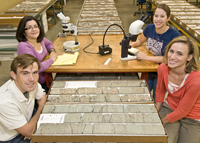Partnerships

Energy and Earth Resources (EER) graduate students are in this program because of their interest in being involved with courses and research that prepare them to be part of meeting the energy, water, and environmental challenges facing the United States and the world as we undergo resource and technology changes that will shape our future economies and life styles.
We offer excellent opportunities for graduate research assistantships and thesis projects for EER students that will make them part of cutting-edge research in these areas. Below is one such highlighted opportunity.
Bureau of Economic Geology
This world-class research organization combines government and industry funding to support investigations of geologic carbon sequestration, the essential element in plans to reduce the emissions of greenhouse gases to the atmosphere. The Bureau’s traditional strength in sub-surface geology, rock properties, and sub-surface fluids has led to its position as the nation’s leading research organization in comprehensive studies of carbon dioxide sequestration processes and environments. It has received sustained funding from the U.S. Department of Energy and has developed partnerships with industry to conduct research in many aspects of carbon sequestration. Its Gulf Coast Carbon Center brings together the in-house and partner expertise to carry out multifaceted research in carbon sequestration including large-scale field injection projects, geologic assessment and modeling, and the economics of carbon sequestration.
The Bureau also has a variety of more conventional oil and gas research projects that are of potential interest to EER students. Its STARR project conducts regional and field studies aimed at increasing royalty income to the state from oil and gas production from state lands. Basin analysis and studies of stratigraphic units important as petroleum reservoirs are prominent parts of Bureau research. Geofluids, salt tectonics, geologic mapping, application of geophysical techniques, and coastal studies are additional areas offering opportunities for participation in Bureau research.
The Bureau of Economic Geology is active in water resources investigations. These include ground-water research, the use of water in energy and mineral development, water use by various agricultural and natural landscapes and the effects of land-use changes and climate variability, and the sustainable use of water resources.
Unconventional hydrocarbon reservoirs are a focus of Bureau of Economic Geology research. The study of massive shale units, including rock properties and fracture systems, is supported by industry consortia. These systems have significantly expanded the domestic petroleum resource base of the United States and Bureau research is advancing the understandings necessary to explore for and produce the hydrocarbons contained in these unconventional reservoirs.
Prospective EER students with bachelors degrees in the geosciences or engineering who would like to be a part of this exciting research at the Bureau of Economic Geology are encouraged to state this interest in their applications for admission to the EER program. The EER Graduate Coordinator will work with Bureau research program scientists to explore opportunities for research assistantships and thesis projects there. This experience, plus course work in geological sciences, business, economics and related areas can provide even those who might normally enter a traditional geology masters program with an option that can prepare them for careers in the changing landscape of energy and water resources.
